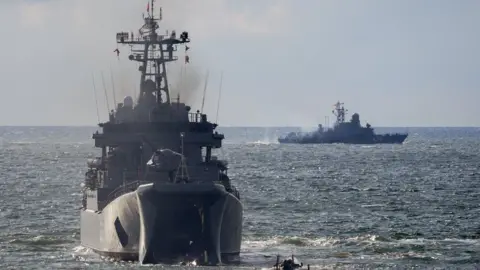Ireland tells Russia live-fire naval exercise is 'not welcome'
 Getty Images
Getty ImagesIreland has told Russia its plans to host live-fire naval exercises off the country's coast are "not welcome".
But the Irish defence minister said the country had no power to stop it.
It comes amid rising tensions over a build-up of Russia's military forces on the Ukraine border and threats of consequences for any invasion from the US and its allies.
Ireland, however, has a long-standing policy of military neutrality and is not part of the Nato military alliance.
Simon Coveney, who holds both the foreign and defence ministerial briefs, told journalists in Brussels that the Irish government had received a notification from Russia about the planned military exercises.
They are due to take place about 240km (150 miles) off the south-west coast of Ireland, he said.
"That is in international waters but it is also part of the exclusive economic zone of Ireland," he explained.
It is also within Ireland's air space, and flights will have to be diverted to avoid the area.
The exclusive economic zone is different from territorial or sovereign waters, and refers to the area where a country has special rights to exploit the ocean's resources. But naval exercises by foreign powers can be carried out there.
"We don't have the power to prevent this happening, but certainly I've made it clear to the Russian ambassador in Ireland that it's not welcome," Mr Coveney said.

Mr Coveney made his remarks as he was preparing to meet with EU counterparts to discuss the crisis in Ukraine, and any non-military response the EU might pursue. He said he planned to raise the naval exercises briefly with the other EU ministers.
Amid the tensions over Ukraine, Russia announced it would stage military exercises with all its fleets across the world, including the Atlantic Ocean.
But the timing and location of have raised eyebrows among some defence pundits.
The area - off the west coast of Europe - is far from any of Russia's permanent naval bases, and is also near several critical transatlantic data cables, which defence experts have warned Russia could pose a risk to.
